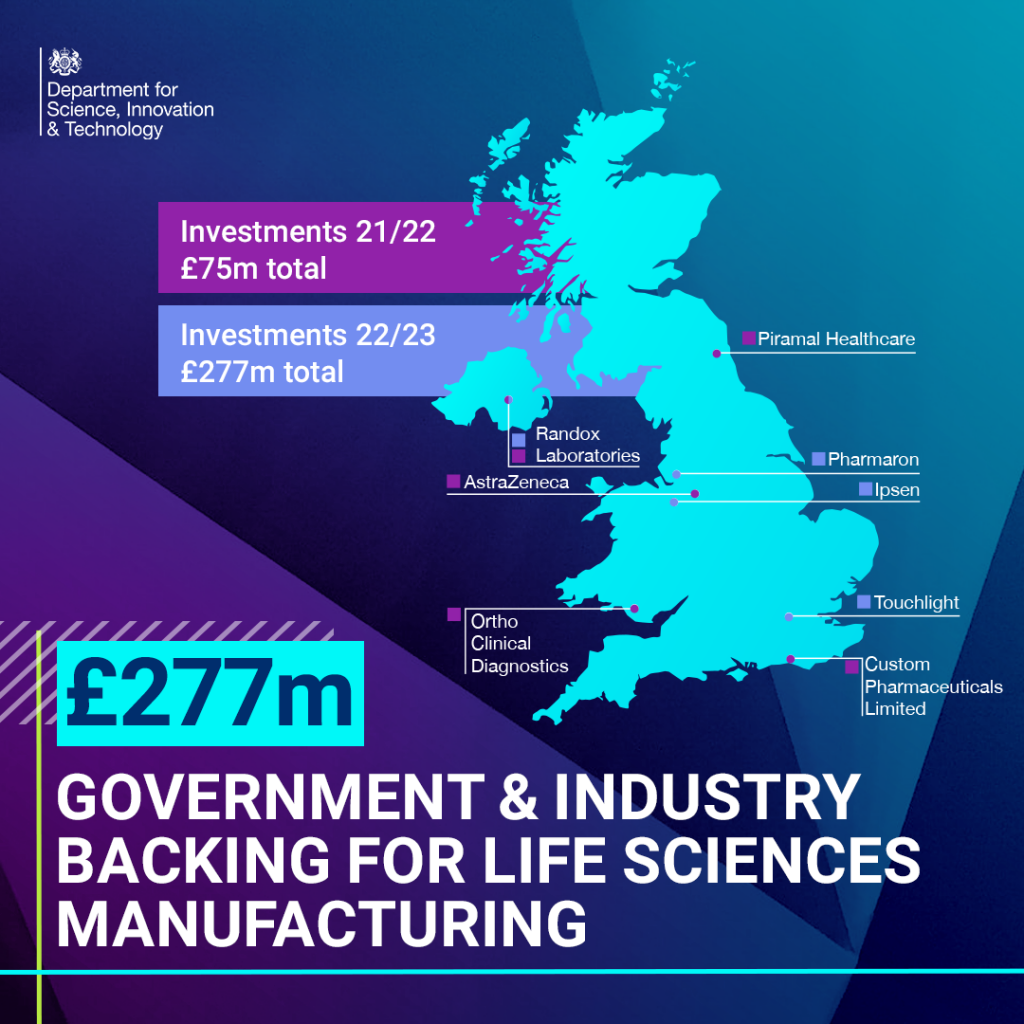FOUR life sciences companies, ranging from medical diagnostics to medicines manufacturing, will see £277 million in joint government and industry backing to help grow and innovate.
The funding, announced by Science Minister George Freeman today, forms the first tranche of winning grants from the Life Sciences Innovative Manufacturing Fund (LSIMF).
£17 million in government funding is supported by additional private investment of £260 million, to back companies investing in life science manufacturing projects that help grow our economy, boost health resilience, deploy innovation, minimise environmental impacts and support levelling up.
The funding will help grow an innovative economy across the UK, supporting more than 500 jobs at companies across the UK, from North Wales to Northern Ireland.
Minister of State for Science, Research & Innovation, George Freeman, said: “The UK’s £94 billion Life Science sector provides over 250,000 high skill jobs across the UK from drug discovery to diagnostics, medtech devices and digital health.
“The industry is being transformed by the pace of change: from AI to genomics, bio manufacturing to smart stents and personalised immunotherapies, technologies are converging to create a new era of advanced digital products.
“That requires new types of advanced manufacturing plant which is why we set up the Life Sciences Innovative Manufacturing Fund, which today’s news shows is working: converting £17 million grants to four companies into £260 million industrial investment.”
LSIMF follows on from the Medicines and Diagnostics Manufacturing Transformation Fund (MDMTF) pilot programme which launched in April 2021. Over its lifespan, MDMTF delivered £75 million in joint government and industry investment, while also creating 224 new jobs and protecting 345 existing roles.
Today’s funding rollout means, combined, the two Funds have delivered £352 million in government and private sector investment into the life sciences sector, while also supporting more than 1000 jobs.
The government’s Life Sciences Vision, published in 2021, set the ambition to create a globally competitive environment for Life Science manufacturing investments, building on the strengths of our manufacturing R&D, our network of innovation centres, the manufacturing response to COVID-19 and delivery of the Medicines and Diagnostics Manufacturing Transformation Fund.
Life sciences are also central to the UK Science and Technology Framework, published earlier this month, which identifies the critical technologies set to make the biggest difference to health and life science progress, as well as plans to improve the regulatory landscape for life sciences.
The successful companies being supported through the first tranche of LSIMF grants to build on those aims are:
- Ipsen – £75 million investment to grow the manufacture of innovative medicines for neurological conditions , creating 39 new jobs and safeguarding a further 37 at their Wrexham facility.
- Pharmaron – £151 million investment in capital and people will substantially grow operations in Liverpool, increasing production capacity four-fold for critical gene therapy and vaccine components and creating 174 jobs, while also safeguarding a further 156.
- Touchlight – £14 million investment will create 17 jobs and protect a further 6, boosting UK health resilience by establishing the commercial scale manufacture of DNA at their Hampton, London base.
- Randox – £36 million investment to modernise the manufacture of antibodies used across diagnostic tests. A new facility in Crumlin, Northern Ireland, will create 90 new jobs.

This will build on an additional £10 million for the Medicines and Healthcare products Regulatory Agency (MHRA) announced at Spring Budget which will accelerate NHS patient access to the most impactful and innovative new treatments.
It will allow the MHRA to introduce new, swift approvals systems from 2024, speeding up access to treatments already approved by trusted international partners and ground-breaking technologies such as cancer vaccines and AI therapeutics for mental health.
Chancellor of the Exchequer, Jeremy Hunt said: “The UK is home to Europe’s largest life science sector – it’s a real British success story which includes the first Covid vaccine that saved millions of lives.
“We want to cement Britain’s competitive advantage by backing more innovative projects to develop, manufacture and export those treatments of the future.”
Minister of State for Health Will Quince said: “We’re harnessing the same spirit of innovation that delivered the Covid vaccine, and working hand in hand with industry and healthcare experts to get cutting-edge medicines to patients faster.
“This is an important step towards strengthening the UK’s long term manufacturing capability, while supporting the development of innovative technologies and ground breaking medicines.
“The life sciences sector is crucial to the UK’s health resilience. Through government and industry investment, we will continue to drive it forward – creating jobs and cementing our position as a global life sciences superpower.”
This announcement comes ahead of tomorrow’s (March 29, 2023) ‘Treasury Connect’ conference where the Chancellor will bring together experts in the Life Sciences sector to discuss ways to harness this thriving sector and help grow the UK economy.
This is the third in a series of five Treasury Connect events focused on the Chancellor’s key growth industries: technology; creative industries; life sciences; advanced manufacturing; and the green economy.

















